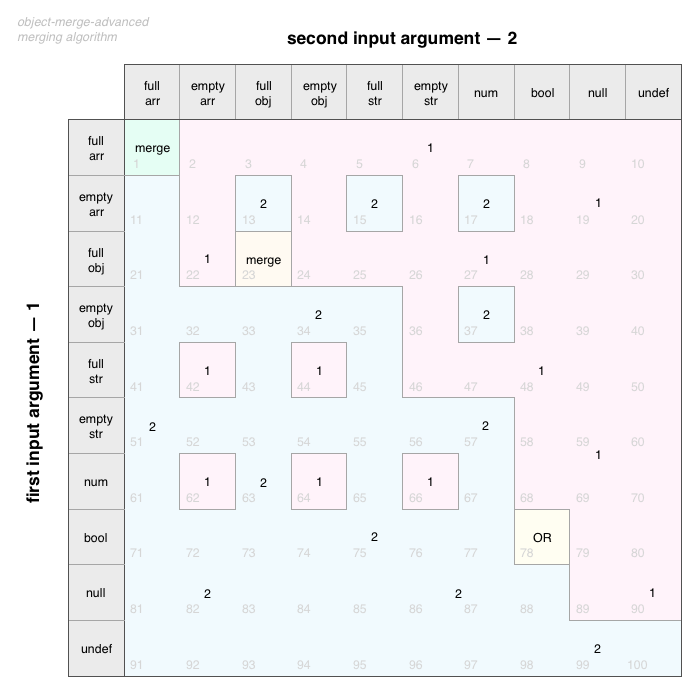// copies all properties from source object to dest object recursively
export function recursivelyMoveProperties(source, dest) {
for (const prop in source) {
if (!source.hasOwnProperty(prop)) {
continue;
}
if (source[prop] === null) {
// property is null
dest[prop] = source[prop];
continue;
}
if (typeof source[prop] === 'object') {
// if property is object let's dive into in
if (Array.isArray(source[prop])) {
dest[prop] = [];
} else {
if (!dest.hasOwnProperty(prop)
|| typeof dest[prop] !== 'object'
|| dest[prop] === null || Array.isArray(dest[prop])
|| !Object.keys(dest[prop]).length) {
dest[prop] = {};
}
}
recursivelyMoveProperties(source[prop], dest[prop]);
continue;
}
// property is simple type: string, number, e.t.c
dest[prop] = source[prop];
}
return dest;
}
Unit test:
describe('recursivelyMoveProperties', () => {
it('should copy properties correctly', () => {
const source: any = {
propS1: 'str1',
propS2: 'str2',
propN1: 1,
propN2: 2,
propA1: [1, 2, 3],
propA2: [],
propB1: true,
propB2: false,
propU1: null,
propU2: null,
propD1: undefined,
propD2: undefined,
propO1: {
subS1: 'sub11',
subS2: 'sub12',
subN1: 11,
subN2: 12,
subA1: [11, 12, 13],
subA2: [],
subB1: false,
subB2: true,
subU1: null,
subU2: null,
subD1: undefined,
subD2: undefined,
},
propO2: {
subS1: 'sub21',
subS2: 'sub22',
subN1: 21,
subN2: 22,
subA1: [21, 22, 23],
subA2: [],
subB1: false,
subB2: true,
subU1: null,
subU2: null,
subD1: undefined,
subD2: undefined,
},
};
let dest: any = {
propS2: 'str2',
propS3: 'str3',
propN2: -2,
propN3: 3,
propA2: [2, 2],
propA3: [3, 2, 1],
propB2: true,
propB3: false,
propU2: 'not null',
propU3: null,
propD2: 'defined',
propD3: undefined,
propO2: {
subS2: 'inv22',
subS3: 'sub23',
subN2: -22,
subN3: 23,
subA2: [5, 5, 5],
subA3: [31, 32, 33],
subB2: false,
subB3: true,
subU2: 'not null --- ',
subU3: null,
subD2: ' not undefined ----',
subD3: undefined,
},
propO3: {
subS1: 'sub31',
subS2: 'sub32',
subN1: 31,
subN2: 32,
subA1: [31, 32, 33],
subA2: [],
subB1: false,
subB2: true,
subU1: null,
subU2: null,
subD1: undefined,
subD2: undefined,
},
};
dest = recursivelyMoveProperties(source, dest);
expect(dest).toEqual({
propS1: 'str1',
propS2: 'str2',
propS3: 'str3',
propN1: 1,
propN2: 2,
propN3: 3,
propA1: [1, 2, 3],
propA2: [],
propA3: [3, 2, 1],
propB1: true,
propB2: false,
propB3: false,
propU1: null,
propU2: null,
propU3: null,
propD1: undefined,
propD2: undefined,
propD3: undefined,
propO1: {
subS1: 'sub11',
subS2: 'sub12',
subN1: 11,
subN2: 12,
subA1: [11, 12, 13],
subA2: [],
subB1: false,
subB2: true,
subU1: null,
subU2: null,
subD1: undefined,
subD2: undefined,
},
propO2: {
subS1: 'sub21',
subS2: 'sub22',
subS3: 'sub23',
subN1: 21,
subN2: 22,
subN3: 23,
subA1: [21, 22, 23],
subA2: [],
subA3: [31, 32, 33],
subB1: false,
subB2: true,
subB3: true,
subU1: null,
subU2: null,
subU3: null,
subD1: undefined,
subD2: undefined,
subD3: undefined,
},
propO3: {
subS1: 'sub31',
subS2: 'sub32',
subN1: 31,
subN2: 32,
subA1: [31, 32, 33],
subA2: [],
subB1: false,
subB2: true,
subU1: null,
subU2: null,
subD1: undefined,
subD2: undefined,
},
});
});
});


const merge = (p, c) => Object.keys(p).forEach(k => !!p[k] && p[k].constructor === Object ? merge(p[k], c[k]) : c[k] = p[k])– Carcinomahttps://gist.github.com/ahtcx/0cd94e62691f539160b32ecda18af3d6– Izeconst merge = (p, c) => Object.keys(p).forEach(k => (p[k] instanceof Object && c[k] instanceof Object) ? merge(p[k], c[k]) : c[k] = p[k]) ?? c– Longstanding